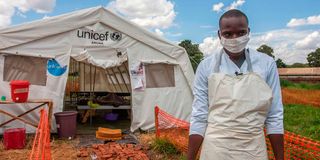Malawi asks UN for more vaccines to battle cholera outbreak

A medical personnel stands in front of a ward of a Cholera Treatment Centre, funded by the Unicef, Malawi Red Cross and UK Aid, at Bwaila Hospital in the capital Lilongwe, Malawi. Malawi is currently facing an outbreak of Cholera.
Malawi is asking the United Nations (UN) for more cholera vaccines, fearing heavy rains could worsen an outbreak of the water-borne disease that has so far claimed 128 lives.
The impoverished southern African country has recorded 4,420 cases since March, one of its highest tallies in a decade.
"We have requested for more vaccines," Storm Kabuluzi, director of preventive health services at the ministry of health, told AFP late Wednesday.
The extra doses are needed for the central and northern regions, where the disease has spread from "traditionally cholera-prone" areas in the south, Kabuluzi said.
Promote hygiene
The number of cases has almost tripled since August, according to government figures, and 24 out of 28 districts are now affected.
"What is important is to contain the cholera outbreak today," said Kabuluzi.
"The good thing with cholera is that we can treat and you can prevent. What is important is to work with the communities to promote hygiene."
Cholera is contracted from a germ that is generally transmitted through contaminated food or water.
It causes diarrhoea and vomiting, and can be especially dangerous for young children.
Safe water and sanitation are crucial for preventing transmission, according to the World Health Organization (WHO), which last week warned Malawi was "on the verge of... a public health crisis."
Malawi's community health ambassador, Maziko Matemba, has warned that the rainy season, which typically starts in November, could make matters worse.
A health ministry spokesman told local newspaper The Nation on Thursday the outbreak had caught authorities "off-guard."
Chlorine, rehydration fluids and other medicaments needed to tackle the disease are also in short supply.
Cholera can be easily treated with oral rehydration solution, but more severe cases may require intravenous fluids and antibiotics, the WHO says.
Worldwide, the disease affects between 1.3 million and four million people each year, causing up to 143,000 deaths.





